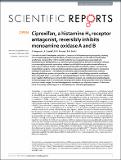Ciproxifan, a H3 receptor inverse agonist, reversibly inhibits human monoamine oxidase A and B
Abstract
Ciproxifan is a well-investigated histamine H3 receptor (H3R) inverse agonist/antagonist, showing an exclusively high species-specific affinity at rodent compared to human H3R. It is well studied as reference compound for H3R in rodent models for neurological diseases connected with neurotransmitter dysregulation, e.g. attention deficit hyperactivity disorder or Alzheimer’s disease. In a screening for potential monoamine oxidase A and B inhibition ciproxifan showed efficacy on both enzyme isoforms. Further characterization of ciproxifan revealed IC50 values in a micromolar concentration range for human and rat monoamine oxidases with slight preference for monoamine oxidase B in both species. The inhibition by ciproxifan was reversible for both human isoforms. Regarding inhibitory potency of ciproxifan on rat brain MAO, these findings should be considered, when using high doses in rat models for neurological diseases. As the H3R and monoamine oxidases are all capable of affecting neurotransmitter modulation in brain, we consider dual targeting ligands as interesting approach for treatment of neurological disorders. Since ciproxifan shows only moderate activity at human targets, further investigations in animals are not of primary interest. On the other hand, it may serve as starting point for the development of dual targeting ligands.
Citation
Hagenow , S , Stasiak , A , Ramsay , R R & Stark , H 2017 , ' Ciproxifan, a H 3 receptor inverse agonist, reversibly inhibits human monoamine oxidase A and B ' , Scientific Reports , vol. 7 , 40541 . https://doi.org/10.1038/srep40541
Publication
Scientific Reports
Status
Peer reviewed
ISSN
2045-2322Type
Journal article
Description
Support was kindly provided by the EU COST Actions CM1103 and CA15135 as well by DFG INST 208/664-1 FUGG and the Polish National Science Centre HARMONY 2012/04/M/N24/00212.Collections
Items in the St Andrews Research Repository are protected by copyright, with all rights reserved, unless otherwise indicated.

